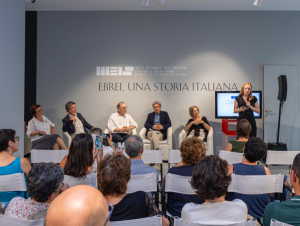EDUCATION Remembrance and awareness at the Museum of Italian Judaism and the Shoah
A five-day-long collaboration to reach one common goal: helping teachers find a way to introduce Italian high school students to new topics, namely the Shoah and the inalienable values at the basis of human rights.
The seminar “Learning from our past – Acting for our future. Teaching about the Holocaust and human rights” kicked off yesterday at the National Museum of Italian Judaism and the Shoah in Ferrara (MEIS). The Olga Lengyel Institute for Holocaust Studies and Human Rights (TOLI) and the Foundation Jewish Contemporary Documentation Center (CDEC), in collaboration with the MEIS and the Contemporary History Institute of Ferrara (ISCO), organized the seminar, which gathered about 40 high school teachers from all over Italy. It will address issues related to the 20th century’s historical debate, including Italian antisemitism in contemporary times, the fascist anti-Semitic policy, the construction of memory regarding deportation during the post-war period, the analysis of causes and effects of the feeling of hatred of the present day.
MEIS Director Simonetta Della Seta held an opening speech in which she emphasized the importance of starting to discuss these issues at the National Museum, whose main goal is to tell Italian Judaism’s past as well as present and future history.
Marco Gulinelli, Councillor for Culture in Ferrara, was also there and reaffirmed the commitment of the city of Ferrara to the MEIS and to the local Jewish community, which are perceived as part of the citizens’ identity. Gulinelli also reminded the audience of the encounter between Primo Levi and Liana Millu, a former partisan who survived the Shoah. She gave him the pencil stub she had used to write her memories, as a highly symbolic handover. “My advice”, Gulinelli concluded, addressing the teachers, “is giving pencil stubs to your students, just like she did, which shall be a warning not to forget”.
Harry D. Wall, member of TOLI’s management board, expressed his satisfaction with visiting the MEIS once again for such an important event and added: “Our institution is named after Olga Lengyel, one of the first victims of the Holocaust who decided to tell her terrible experience. Our main goal is to help people learn the Shoah’s harsh lesson, in order to prevent it from happening ever again, especially in such sensitive times, where we are starting to witness anti-Semitic and racist episodes once again”.
“Outside our office”, concluded Oana Nestian Sandu, TOLI European programs Director “there is a sign reading as follows: ‘We love our teachers’. We would like to thank the teachers who are here today, because what they will teach their students is a hard and uncomfortable subject, yet an important lesson on human behaviour and on our responsibility towards those who are treated unjustly.”
“With its rich Jewish history, Ferrara is particularly fit to host the seminar”, Gadi Luzzatto Voghera, CDEC Director, said: “Working here in order to create a new learning path is extremely significant. Italian Jews played a major role in building the Italian identity. The goal of this seminar is to create a teacher network reaching as many cities as possible. We offer innovative learning tools, but teachers are the ones implementing specific action.”
“There is another organisation we must thank for contributing to these transformations”, he said, “The National Association of Former Deportees in Nazi Camps, and especially the work of Grazia Di Veroli, who recently passed away, in supporting teachers amazingly with her humanity.”
Anna Quarzi, ISCO Director and one of MEIS’s first supporters, is also part of this network: “I strongly believe that teacher training is a key element. We must be ready to work with them in order to reinvent our approach towards lieux de mémoire and decide the role they are going to play.”
“When you will visit the Jewish lieux de mémoire in Ferrara”, said Massimo Acanfora Torrefranca, vice-president of the Jewish community of Ferrara, “you will find a commemorative plaque with the names of the 156 victims of the Holocaust on the wall of the Jewish community house, which is perhaps the most ancient in Italy. These are more than mere figures, since they represent a huge part of the community, namely more than 20%. However, the point is not the gravity of the loss these deaths represented to Italian Judaism, but to all mankind. In my opinion, it is no coincidence that this seminar is kicking off on the first day of Elul, the Jewish month par excellence dedicated to reflection and to making society fairer.”
The seminar’s next public appointment is “Learning from our past – Acting for our future. Teaching about the Holocaust and human rights”, an open conference scheduled for 4th September at 4 pm at the Sala Estense (2, Piazza del Municipio). The event will include the participation of Simonetta Della Seta, MEIS Director, with “The Italian case: breaking a coexistence of over 2000 years”; Anna Maria Quanzi, ISCO President, with “Anti-Semitic persecutions in Emilia Romagna”; Cesare Finzi with his testimony “The day that changed my life”; Milena Santerini, Pedagogy Professor at Università Cattolica del Sacro Cuore of Milan, with “Hatred, intolerance, xenophobia and racism”; and teachers who have received training from TOLI, CDEC and ISCO, with “Back to school: the consequences of training on didactics”. The conference will be opened and moderated by Massimo Acanfora Torrefranca, vice-president of the Jewish community of Ferrara.
Translated by Sara Facelli and revised by Claudia Azzalini, students at the Advanced School for Interpreting and Translation of Trieste University and interns at the newspaper office of the Union of the Italian Jewish Communities.

